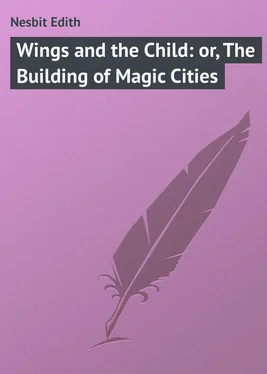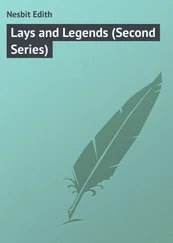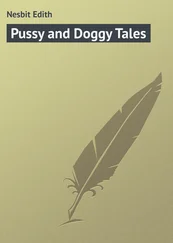Edith Nesbit - Wings and the Child - or, The Building of Magic Cities
Здесь есть возможность читать онлайн «Edith Nesbit - Wings and the Child - or, The Building of Magic Cities» — ознакомительный отрывок электронной книги совершенно бесплатно, а после прочтения отрывка купить полную версию. В некоторых случаях можно слушать аудио, скачать через торрент в формате fb2 и присутствует краткое содержание. Жанр: foreign_prose, на английском языке. Описание произведения, (предисловие) а так же отзывы посетителей доступны на портале библиотеки ЛибКат.
- Название:Wings and the Child: or, The Building of Magic Cities
- Автор:
- Жанр:
- Год:неизвестен
- ISBN:нет данных
- Рейтинг книги:3 / 5. Голосов: 1
-
Избранное:Добавить в избранное
- Отзывы:
-
Ваша оценка:
- 60
- 1
- 2
- 3
- 4
- 5
Wings and the Child: or, The Building of Magic Cities: краткое содержание, описание и аннотация
Предлагаем к чтению аннотацию, описание, краткое содержание или предисловие (зависит от того, что написал сам автор книги «Wings and the Child: or, The Building of Magic Cities»). Если вы не нашли необходимую информацию о книге — напишите в комментариях, мы постараемся отыскать её.
Wings and the Child: or, The Building of Magic Cities — читать онлайн ознакомительный отрывок
Ниже представлен текст книги, разбитый по страницам. Система сохранения места последней прочитанной страницы, позволяет с удобством читать онлайн бесплатно книгу «Wings and the Child: or, The Building of Magic Cities», без необходимости каждый раз заново искать на чём Вы остановились. Поставьте закладку, и сможете в любой момент перейти на страницу, на которой закончили чтение.
Интервал:
Закладка:
Nesbit E. Edith
Wings and the Child; Or, The Building of Magic Cities
PART I
CHAPTER I
Of Understanding
It is not with any pretension to special knowledge of my subject that I set out to write down what I know about children. I have no special means of knowing anything: I do, in fact, know nothing that cannot be known by any one who will go to the only fount of knowledge, experience. And by experience I do not mean scientific experience, that is the recorded results of experiments, the tabulated knowledge wrung from observation; I mean personal experience, that is to say, memory. You may observe the actions of children and chronicle their sayings, and produce from these, perhaps, a lifelike sketch of a child, as it appears to the grown-up observer; but observation is no key to the inner mysteries of a child's soul. The only key to those mysteries is in knowledge, the knowledge of what you yourself felt when you were good and little and a child. You can remember how things looked to you, and how things looked to the other children who were your intimates. Our own childhood, besides furnishing us with an exhaustless store of enlightening memories, furnishes us with the one opportunity of our lives for the observation of children – other children. There is a freemasonry between children, a spontaneous confidence and give-and-take which is and must be for ever impossible between children and grown-ups, no matter how sympathetic the grown-up, how confiding the child. Between the child and the grown-up there is a great gulf fixed – and this gulf, the gulf between one generation and another, can never be really bridged. You may learn to see across it, a little, or sometimes in rare cases to lean very far across it so that you can just touch the tips of the little fingers held out from the other side. But if your dealings with those on the other side of the gulf are to be just, generous, noble, and helpful, they must be motived and coloured by your memories of the time when you yourself were on the other side – when you were a child full of your own hopes, dreams, aims, interests, instincts, and imaginings, and over against you, kindly perhaps, tenderly loving, often tenderly loved, but still in some mysterious way antagonistic and counting as "Them," were the grown-ups. I might say elders, parents, teachers, spiritual pastors and masters, but the word which the child himself uses seems to me, for all reasons, to be the best word for my use, because it expresses fully and finally the nature of the gulf between. The grown-ups are the people who once were children and who have forgotten what it felt like to be a child. And Time marks with the same outward brand those who have forgotten and those who do not forget. So that even the few who have managed to slip past the Customs-house with their bundle of memories intact can never fully display them. These are a sort of contraband, and neither the children nor the grown-ups will ever believe that that which we have brought with us from the land of childhood is genuine. The grown-ups accuse us of invention, sometimes praise us for it, when all we have is memory; and the children imagine that we must have been watching them, and thus surprised a few of their secrets, when all that we have is the secrets which were our own when we were children – secrets which were so bound up with the fibre of our nature that we could never lose them, and so go through life with them, our dearest treasures. Such people feel to the end that they are children in a grown-up world. For a middle-aged gentleman with a beard or a stout elderly lady with spectacles to move among other elderly and spectacled persons feeling that they are still children, and that the other elderly and spectacled ones are really grown-ups, seems thoroughly unreasonable, and therefore those who have never forgotten do not, as a rule, say anything about it. They just mingle with the other people, looking as grown-up as any one – but in their hearts they are only pretending to be grown-up: it is like acting in a charade. Time with his make-up box of lines and wrinkles, his skilful brush that paints out the tints and the contours of youth, his supply of grey wigs and rounded shoulders and pillows for the waist, disguises the actors well enough, and they go through life altogether unsuspected. The tired eyes close on a world which to them has always been the child's world, the tired hands loose the earthly possessions which have, to them, been ever the toys of the child. And deep in their hearts is the faith and the hope that in the life to come it may not be necessary to pretend to be grown-up.
Such people as these are never pessimists, though they may be sinners; and they will be trusting, to the verge of what a real grown-up would call imbecility. To them the world will be, from first to last, a beautiful place, and every unbeautiful thing will be a surprise, hurting them like a sudden blow. They will never learn prudence, or parsimony, nor know, with the unerring instinct of the really grown-up, the things that are or are not done by the best people. All their lives they will love, and expect love – and be sad, wondering helplessly when they do not get it. They will expect beautiful quixotic impulsive generosities and splendours from a grown-up world which has forgotten what impulse was: and to the very end they will not leave off expecting. They will be easily pleased and easily hurt, and the grown-ups in grain will contemplate their pains and their pleasures with an uncomprehending irritation.
If these children, disguised by grown-up bodies, are ever recognised for what they are, it is when they happen to have the use of their pens – when they write for and about children. Then grown-up people will call them intelligent and observant, and children will write to them and ask the heart-warm, heart-warming question, "How did you know?" For if they can become articulate they will speak the language that children understand, and children will love, not them, for their identity is cloaked with grey grown-up-ness, but what they say. There are some of these in whom the fire of genius burns up and licks away the trappings under which Time seeks to disguise them – Andersen, Stevenson, Juliana Ewing were such as these – and the world knows them for what they were, and adores in them what in the uninspired it would decry and despise.
To these others who have the memories of childhood untainted and yet have not the gift and relief of words, to these I address myself in the first instance, because they will understand without any involved explanation on my part what it is that I am driving at, and it is these who, alone, can teach the real grown-ups the things which they have forgotten. For these things can be taught, these things can be re-learned. I would have every man and woman in whom the heart of childhood still lives, protest, however feebly and haltingly, yet with all the power of the heart, against machine-made education – against the instruction which crams a child with facts and starves it of dreams, which forces the free foot into heavy boots and bids it walk on narrow pavement, which crushes with heavy hand the wings of the soul, and presses the flower of imagination flat between the pages of a lexicon.
CHAPTER II
New Ways
"What," we ask with anxious gravity, "what is the best sort of teaching for children?" One might as sanely ask what is the best sort of spectacles for men, or the best size in gloves for women. And the blind coarse generalisation which underlies that question is the very heart and core of the muddled, musty maze we call education. We talk of the best sort of education for children, as we might talk of the best sort of polish for stoves, the best sort of nourishment for mice. Stoves are all alike, they vary in ugliness perhaps, but the iron soul of one is as the iron soul of the other. The polish that is good for one is good for all. Mice may, and do, vary in size and colour; their mousehood does not vary, nor their taste for cheese. In the inner nature, in the soul and self of it, each child is different from any other child, and the education that treats children as a class and not as individual human beings is the education whose failure is bringing our civilisation about our ears even as we speak.
Читать дальшеИнтервал:
Закладка:
Похожие книги на «Wings and the Child: or, The Building of Magic Cities»
Представляем Вашему вниманию похожие книги на «Wings and the Child: or, The Building of Magic Cities» списком для выбора. Мы отобрали схожую по названию и смыслу литературу в надежде предоставить читателям больше вариантов отыскать новые, интересные, ещё непрочитанные произведения.
Обсуждение, отзывы о книге «Wings and the Child: or, The Building of Magic Cities» и просто собственные мнения читателей. Оставьте ваши комментарии, напишите, что Вы думаете о произведении, его смысле или главных героях. Укажите что конкретно понравилось, а что нет, и почему Вы так считаете.












